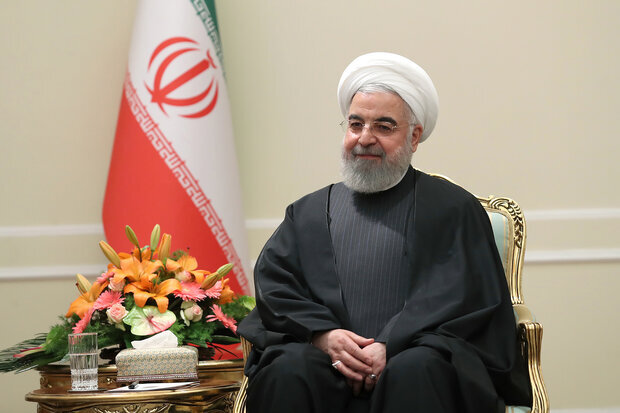‘Psychological impact of coronavirus and sanctions are worse than their real impact,’ president says
TEHRAN — President Hassan Rouhani has said the U.S. sanctions are like coronavirus, explaining that the psychological impact of both are worse than their real impact.
“The European Union is expected to stand up to the U.S. illegal measures,” Rouhani said in a meeting with Austrian Foreign Minister Alexander Schallenberg in Tehran on Sunday.
During the meeting, the two sides discussed bilateral relations as well as other issues of mutual interest.
Rouhani hailed the friendly Tehran-Vienna relations, saying the two countries have good potential for cooperation, especially in the economic sphere.
He expressed the hope that Austria would try to expand its ties with Iran and would ignore the illegal pressures by the United States.
Heading a delegation, Schallenberg visited Iran late on Saturday to meet with senior Iranian officials.
He held two rounds of talks with his Iranian counterpart Mohammad Javad Zarif on Sunday, discussing bilateral relations as well as the latest developments regarding the Iran nuclear agreement, also known as the Joint Comprehensive Plan of Action (JCPOA).
In his remarks, Rouhani said the JCPOA can play a role in the establishment of security and peace in the region and the world.
“We still believe that we can save Barjam (JCPOA),” he said.
He denounced the U.S. sanctions that target the import of foodstuff and medicine to Iran, saying, “The imposition of these sanctions is a terrorist measure and we expect the European Union to fulfil its humanitarian duty in this regard.”
The JCPOA was struck between Iran and the five permanent UN Security Council members — the United States, Russia, China, France, and the UK — as well as Germany and the European Union.
Austria and Switzerland were the venues of nearly two years of intensive talks the produced the JCPOA. The historic agreement was officially signed in Vienna on July 14, 2015.
The accord came under increasing strain ever since U.S. President Donald Trump announced the U.S. withdrawal from it in May 2018 and unleashed the “toughest ever” sanctions against Iran despite worldwide objections.
On May 8, exactly one year after the U.S. abandoned the deal, Tehran announced that its “strategic patience” is over and began to partially reduce its commitments to the agreement at bi-monthly steps.
Eventually, in its fifth and final step on January 5, Iran suspended all limits under the JCPOA.
Elsewhere in his remarks, Rouhani emphasized that the security of the region must be provided only by regional countries.
“All of our region’s problems have resulted from the illegal interventions of the U.S. in the affairs of this region,” he said.
“We believe the security of this region is important for Europe’s security and also for the security of the energy path of the whole world and Europe,” he added.
He also said his peace initiative, dubbed the Hormuz Peace Endeavor (HOPE), has been welcomed by other countries.
President Rouhani, during his speech at the 74th UN General Assembly, called on regional states to join the Hormuz Peace Endeavor.
“Based upon the historical responsibility of my country in maintaining security, peace, stability, and progress in the Persian Gulf region and Strait of Hormuz, I would like to invite all the countries directly affected by the developments in the Persian Gulf and the Strait of Hormuz to the ‘Coalition for Hope’, meaning Hormuz Peace Endeavor,” Rouhani said at the summit.
He added, “The Coalition for Hope is based on important principles such as compliance with the goals and principles of the United Nations, mutual respect, equal footing, dialog and understanding, respect for territorial integrity and sovereignty, inviolability of international borders, the peaceful settlement of all disputes, and more importantly, the two fundamental principles of non-aggression and non-interference in the domestic affairs of each other. The presence of the United Nations is necessary for the creation of an international umbrella in support of the Coalition for Hope.”
TAGS


No comments:
Post a Comment